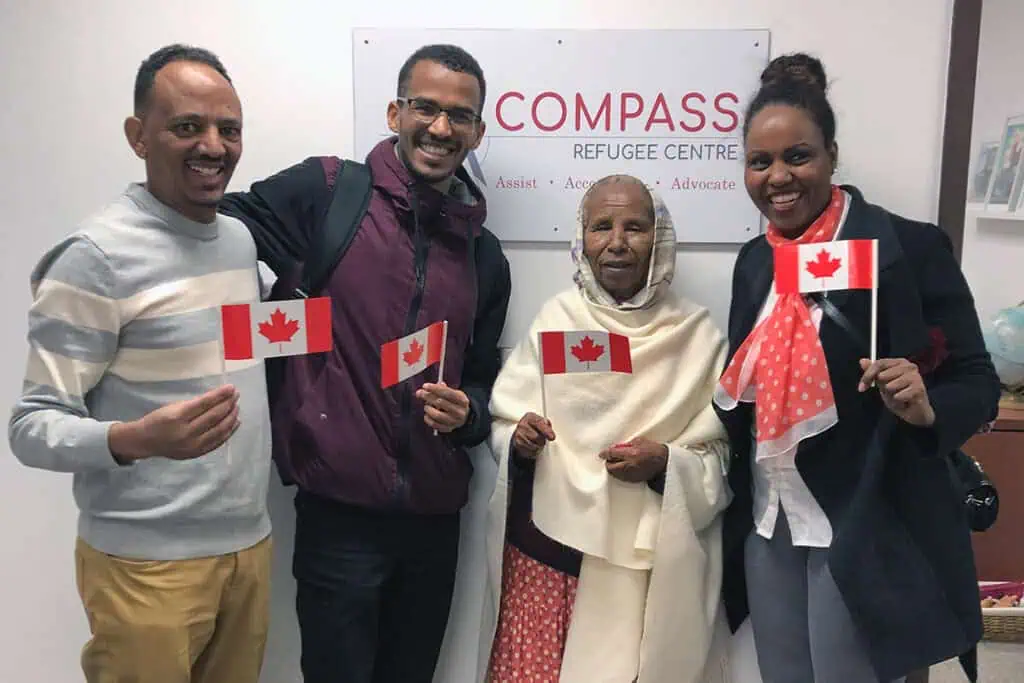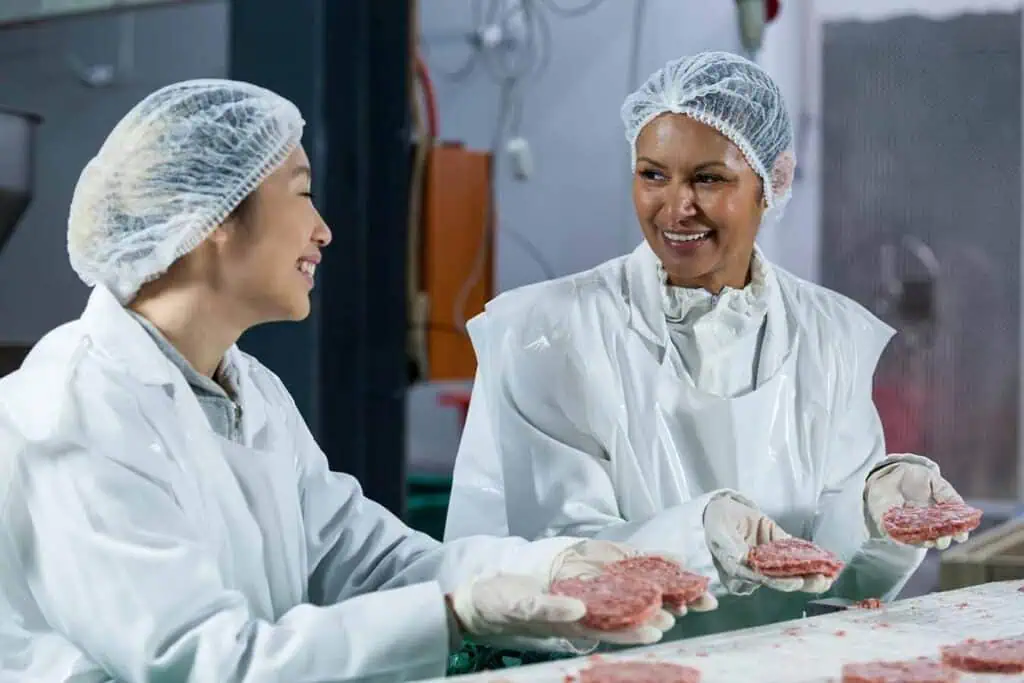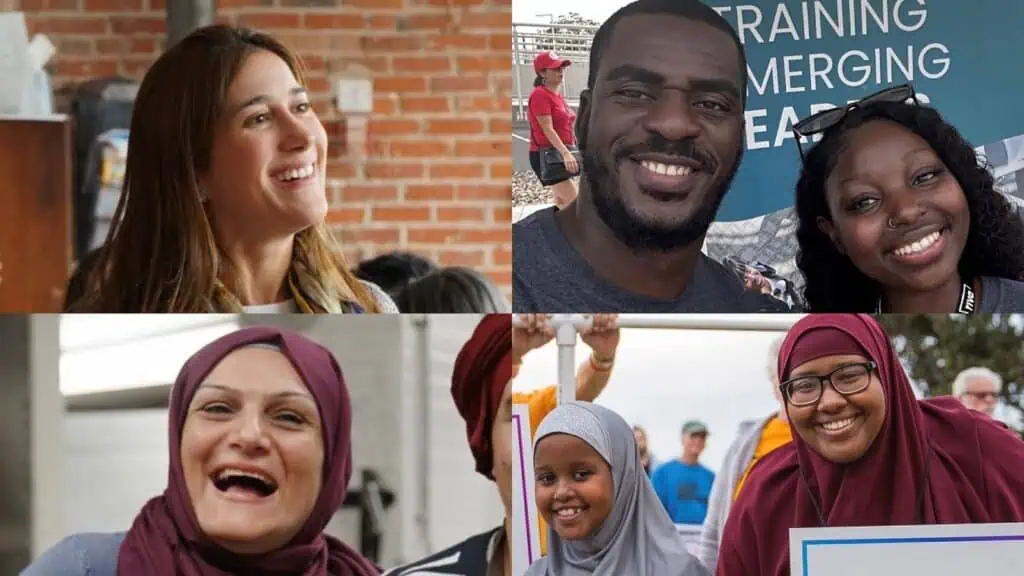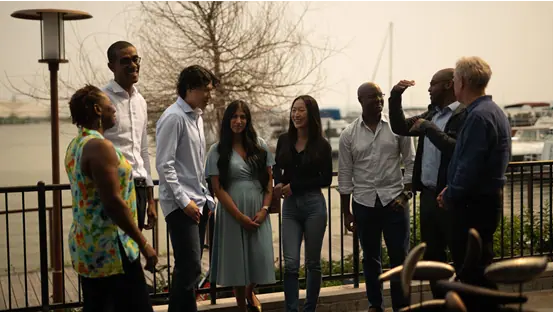How Our Partners are Working to Ensure Equitable COVID-19 Vaccine Access for Immigrants and Refugees

Immigrants and refugees have been disproportionately affected by COVID-19, with many working on the front lines of the pandemic. In the U.S., 12 million immigrants and refugees work in occupations such as health care and transportation, or in roles that have been some of the hardest hit economically, such as food and domestic services. Similarly, in Canada, immigrants and refugees have higher rates of employment in essential and frontline jobs in comparison to the Canadian-born population.
Yet many immigrant and refugee communities have also experienced a complex range of challenges in accessing the COVID-19 vaccine. These barriers include an inability to take paid time off for a vaccine appointment, lack of transportation, childcare demands, inadequate linguistically appropriate materials, and even fears regarding immigration status. According to a Kaiser Family Foundation May 2021 survey of Hispanic adults in the U.S., 31 percent of “potentially undocumented” Hispanic adults surveyed said they had received at least one dose of the COVID-19 vaccine, compared with 61 percent of permanent residents and 46 percent of U.S.-born respondents. A Statistics Canada study showed that immigrants are less likely than those born in Canada to get the vaccine.
In response, this spring, the WES Mariam Assefa Fund established a dedicated pool of funding for our grantee and investee partners in the U.S. and Canada to start or expand their vaccine equity efforts. Although few partners have a specific health focus, many are addressing the issue of vaccine access in their communities as part of their commitment to an inclusive and safe economic recovery from the impacts of the pandemic. As a workforce funder, we too see direct connections between supporting vaccine equity and fostering an inclusive economy: ensuring that all individuals can get vaccinated will help accelerate a safer return to work and a more just economic recovery.
As of August 2021, we have awarded grants totaling over $350,000 USD to support our partners’ efforts to address challenges that immigrants and refugees face in safely and effectively accessing the COVID-19 vaccine. Most grants range from $15,000 USD to $45,000 USD, and are structured as general operating support to ensure organizations have flexibility to meet the evolving needs of their communities as the vaccine is rolled out and the pandemic’s impacts shift.
Now, several months into this work, we’re sharing the insights gleaned from our partners on vaccine access barriers in immigrant and refugee communities and the promising solutions they are implementing to ensure equity:
First, we must focus on hard-to-reach populations and use tailored outreach to specific communities that addresses reasons contributing to vaccine hesitancy. Relatedly, the depth of need for support around language access is significant, particularly around this complex topic.
- In San Antonio and South Texas, Sueños Sin Fronteras de Texas is creating culturally sensitive, bilingual health communication and community engagement strategies to increase empowerment, confidence, and acceptance among undocumented communities of color, including pregnant and breastfeeding clients.
- In Quebec, the Association of Canadian Studies (ACS) is working to understand vaccine hesitancy and accessibility in the Filipino community.
“Working with community-based organizations such as the Filipino Association of Montreal and Suburbs (FAMAS), Migrante QC, and PINAY QC, we will collect data through a survey and launching a targeted awareness campaign to address specific concerns relating to vaccine safety and efficacy,” said Jack Jedwab, CEO of ACS.

A proven solution to ensure health equity is to train trusted community messengers. The Fund’s partners are supporting leaders from immigrant and refugee communities to help their neighbors access public health information, navigate the system, and get safe transportation to appointments.
- Many Languages One Voice (MLOV) is training promotoras, community members as health promoters, to spread the word about COVID-19 vaccine access and education across multiple languages for immigrant and refugee communities in Washington, D.C.
“Our goal is to ensure language access within the vaccine appointment process across the District of Columbia. We are also mobilizing promotoras to canvas historically excluded neighborhoods, connect immigrant and refugee community members with vaccine appointments, and distribute transportation stipends,” said Malauna Steele, Director of Finance at MLOV.
- ActionDignity is managing a multilingual hotline to support immigrants living in Calgary Northeast with vaccination bookings, including transportation. ActionDignity is expanding this initiative to reach immigrants living in other Calgary neighborhoods, essential workers, farm workers, those without health insurance, refugees, and other communities facing barriers. ActionDignity is also partnering with cultural brokers and advocates, ethnocultural organizations, and faith-based organizations.
- Building Skills Partnership is providing culturally relevant, Spanish language vaccination education and outreach to property service workers in California by training community-level spokespeople, hosting a worker hotline and phone banking, and collaborating with the Kaiser Permanente health system to meet the needs of Latinx workers in low-income households.
The Fund’s partners are also targeting the unique needs of different workers and communities—including workers without documentation—and tailoring their approach to reflect considerations by sector and occupation.
- For example, a key concern for undocumented workers is fear of deportation. The Workers’ Action Centre (WAC) is providing information about vaccine access to undocumented workers in WAC’s Latinx networks in the Greater Toronto Area.
“We see the barriers that racialized and immigrant workers face, such as finding information in their first language, clinics not being open after their shifts, or accessing technology to book appointments. For undocumented, uninsured workers, there is fear and uncertainty about registering and sharing information,” said Veronica Zaragoza, an organizer at Workers’ Action Centre. “We partnered with health providers to host clinics where more than 1,800 essential workers were vaccinated. It’s been amazing to see how happy workers are to get the vaccine in an environment where they feel safe and supported, and people are there to answer questions in their own language.”
- Digital channels, such as government-run websites, have been critical ways to learn about the vaccine and make appointments, but digital access is a barrier for many immigrant and refugee workers. Code the Dream is improving apps that support vaccine equity and health care access for agricultural workers, including “Conectate Carolina,” which serves more than 150,000 farmworkers in South Carolina, and “Vamos,” which supports vaccine access for agricultural workers by helping partner organizations locate labor camps, provide health and other related services, and track outreach for migrant farmworkers.
“Code the Dream is proud to work with partner organizations to develop apps that will support their outreach to migrant farmworkers, which will be a long-term effort because of the conditions under which migrant farmworkers labor,” says Lori Fernald Khamala, Code the Dream’s Program Director. “This is important to us because multiple Code the Dream program participants have come from farmworker families, and now they are the developers creating the apps that serve migrant workers. We believe technology should come from our communities and benefit our communities.”
Above all, this work cannot be done in silos, and partnerships are incredibly important. Sharing lessons learned and best practices for emergency response can help accelerate health equity.
- Welcoming America is providing financial support to 10 different communities in their national network and gathering stories on compelling community-led practices so that others can adopt them.
“In building a nation of neighbors, a successful and equitable vaccine rollout must intentionally include immigrant Americans. With the generous support of the WES Mariam Assefa Fund, we are bolstering our members’ efforts at the local level to reinforce trust and strong communications across racially and ethnically diverse residents that will not only increase vaccine uptake but enable more equitable and cohesive communities,” said Rachel Peric of Welcoming America.
In addition to the partners’ efforts above, the Fund’s vaccine equity grants are also supporting:
- Centreville Immigration Forum’s outreach and surveying in local communities in Virginia, especially Latinx and Indigenous (primarily Maya Ixil) communities and immigrants who are undocumented or in mixed status families.
- Inclusive Action for the City’s vaccine outreach in Los Angeles, including by engaging small businesses and micro-entrepreneurs as Community Ambassadors to provide localized and accurate COVID-19 vaccine information and assistance in finding appointment locations.
- The International Rescue Committee’s efforts across the U.S. to improve language access around the vaccine, including through interpretation services provided by community outreach specialists who offer both linguistic access and culturally competent support.
- Immigrant Services Association of Nova Scotia’s work to address barriers for the most vulnerable groups of immigrants in Halifax, Nova Scotia, including refugees, women, seniors, newcomers with literacy and language barriers, and those living with health and disability issues.
- Pioneer Valley Workers’ Center’s outreach and advocacy to increase awareness about the vaccine with more than 700 monolingual Spanish-speaking community members in Western Massachusetts, in partnership with Brightwood Clinic and the New North Citizens Council.
- National Partnership for New Americans’ national communications campaign to increase vaccine confidence and access, “We’re Ready to Protect Ourselves & Our Families.”




